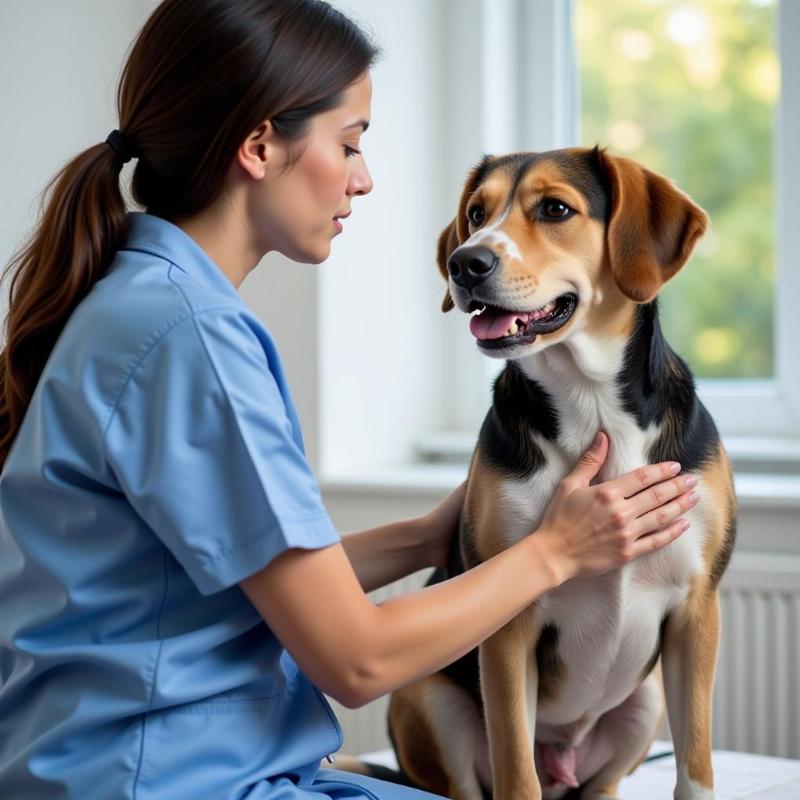The question “is it normal for a dog to eat their puppies?” is a disturbing one, but it’s important to understand this unsettling behavior. While it might seem unthinkable, puppy cannibalism does occur, and it’s crucial to know the reasons why and how to prevent it. This article will explore the potential causes, ranging from stillbirth to stress, and provide practical advice for safeguarding your dog’s litter.
First-time dog breeders might be particularly shocked by this behavior, wondering if their dog is “bad” or “broken.” The answer is usually more nuanced than that. Cannibalism in dogs, especially new mothers, is often driven by instinct and survival mechanisms, though it can also be a sign of underlying health issues. Recognizing the difference is vital for both the mother dog’s well-being and the survival of her puppies.
Understanding the Disturbing Behavior: Why Would a Dog Eat Her Puppies?
Several factors can contribute to a mother dog eating her puppies. It’s rarely a malicious act and is often rooted in instinctive behaviors.
Stillbirth and Deformities
One of the most common reasons is that the puppy was stillborn or severely deformed. A mother dog may instinctively consume a stillborn puppy to protect the rest of the litter from infection or predators, a behavior seen in the wild. Similarly, puppies born with severe deformities that impact their survival may also be culled by the mother.
Stress and Anxiety
A stressed or anxious mother dog can also exhibit this behavior. An overwhelming environment, lack of a safe and quiet denning area, or constant disturbance can lead to extreme stress, triggering this drastic measure. Overcrowding, especially in multi-dog households, can exacerbate this issue.
Lack of Maternal Instinct or Inexperience
First-time mothers, particularly young ones, may lack the necessary maternal instincts or simply be overwhelmed by the experience. They may accidentally injure a puppy during birth or reject the entire litter due to inexperience.
Mastitis and Pain
Mastitis, an infection of the mammary glands, can cause significant pain during nursing. A mother dog experiencing this discomfort might reject her puppies and, in extreme cases, resort to cannibalism. Other medical conditions causing pain can also contribute to this behavior.
Nutritional Deficiencies
While less common in well-cared-for dogs, severe nutritional deficiencies can drive a mother dog to eat her puppies as a desperate attempt to regain lost nutrients. This is more prevalent in stray or neglected dogs.
Preventing Puppy Cannibalism: Protecting Your Litter
Understanding the underlying causes is the first step in prevention. Here are crucial steps to safeguard your dog’s litter:
Provide a Safe and Quiet Den
A dedicated whelping box in a quiet, low-traffic area is essential. This space should be comfortable, clean, and provide the mother dog with a sense of security and privacy.
Ensure Proper Nutrition
A balanced and nutritious diet, especially formulated for pregnant and lactating dogs, is vital for the mother’s health and the puppies’ development. Consult your veterinarian for specific dietary recommendations.
Monitor the Mother and Puppies Closely
Regularly check on the mother and her puppies, especially during the first few weeks. Look for signs of stress, illness, or rejection.
Seek Veterinary Care
If you notice any unusual behavior or health concerns, consult your veterinarian immediately. Early intervention is crucial for addressing any underlying medical issues.
Socialize the Mother Dog
Proper socialization before breeding can help prepare the mother dog for the demands of motherhood. Expose her to various sights, sounds, and people to reduce anxiety and promote healthy social behaviors.
Conclusion: Addressing a Difficult Topic
The issue of a dog eating her puppies is a complex one, requiring understanding and proactive measures. By addressing the potential causes and implementing preventative strategies, you can significantly reduce the risk and ensure the well-being of both the mother dog and her litter. Don’t hesitate to seek professional guidance from a veterinarian or experienced breeder if you have any concerns.
FAQ: Common Questions About Canine Cannibalism
-
Is it always a sign of aggression when a dog eats her puppies? No, often it’s driven by instinct, stress, or underlying health problems.
-
Can I reintroduce puppies to a mother who has previously eaten one? This is risky and should only be attempted under close veterinary supervision.
-
Are certain dog breeds more prone to this behavior? There’s no definitive breed-specific predisposition, but stress and inexperience can play a role in any breed.
-
How can I tell if my dog is stressed? Signs include pacing, panting, excessive licking, and changes in appetite or sleep patterns.
-
What should I do if I witness my dog eating a puppy? Separate the remaining puppies immediately and contact your veterinarian.
-
Can nutritional supplements help prevent this behavior? Consult your veterinarian for appropriate supplements, but a balanced diet is paramount.
-
Is it possible to prevent this entirely? While not always preventable, proactive measures can significantly reduce the risk.
 Bác sĩ thú y khám chó
Bác sĩ thú y khám chó
Beautdogs.us: Your Trusted Source for Dog Care
Beautdogs.us is a leading dog lifestyle website in the US, dedicated to providing comprehensive and reliable information on dog care, breed specifics, and products. We offer expert advice for both novice and experienced dog owners, covering everything from nutrition and training to health and wellness. Our goal is to empower you with the knowledge and resources you need to provide the best possible care for your furry companion. Contact us for expert advice: Email: [email protected], Phone: +1 501-555-7529.